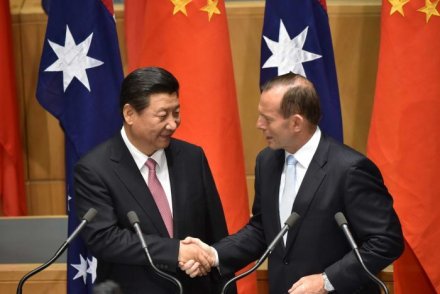China free trade agreement details within weeks of release
ABC Radio Australia
China free trade agreement details within weeks of release
21 May 2015
By business reporter Pat McGrath

(AFP)
Six months after the deal was struck, the full details of Australia’s trade agreement with China are expected to be released within weeks.
Austrade’s top official in Beijing, Michael Clifton, has told the ABC has officials from both countries are finalising the exact wording of the deal in English and Chinese.
"My understanding is that we’re on track towards a signing of the agreement, in the next six to eight weeks," he said.
"And we would hope to see entry into force before year’s end."
Trade Minister Andrew Robb’s office has confirmed the deal is likely to be finalised by the end of June.
The Prime Minister Tony Abbott and China’s President Xi Jinping signed the agreement at an ceremony Canberra in November.
"I am pleased to announce the completion of negotiations for a China-Australia Free Trade Agreement," Mr Abbott said in statement released at the time.
Yet the exact details of the agreement have remained a mystery for six months.
Michael Clifton said there is nothing unusual about the time it is taking to finalise the full text.
"There’s nothing sinister in the time it’s taking," he said.
"This is a standard practice in terms of ensuring that the text in Chinese and text in English are perfectly aligned and there’s no room for doubt once the signatures are placed on the document," he said.
FTAs in Asia ’highly politicised’
Murdoch University trade analyst Jeffrey Wilson questions why the two countries signed a statement of intent on the deal potentially a year before it being finalised.
"It’s certainly unusual in the negotiation of free trade agreements to announce the agreement to agree later on ... rather than the final text of the agreement," he said.
"And that certainly reflects the highly politicised nature of not only this FTA [free trade agreement], but in fact most FTAs in Asia, which serve the dual purpose of both being economic trade agreements but also broader political agreements that signal an intention between governments to work towards in other issues more broadly."
Former Australian trade negotiator Alan Oxley, who now runs the trade consultancy firm ITS Global, said there is nothing unusual about the time it has taken for the deal to be completed.
"It was about a year with the US agreement," he said.
"And in the China case there’s something different. The Chinese quite late in the piece agreed to some measures which weren’t expected.
"It’s quite possible that they might have needed to do more work on those than would have normally been the case."
Deal expected to benefit a range of services firms
The government announced some of the details of the deal in November, including the removal of all tariffs on resources exports to China.
China has agreed to phase out dairy tariffs some time during the next 11 years.
Similar gains have been promised for beef and lamb exporters.
In the services sector, law firms will be able to set up local partnerships in the Shanghai free trade zone.
There is a promise of more market access for access for Australian banks.
The healthcare, tourism and education sectors have also all been promised big gains when the deal is finally released.
However, Austrade’s Michael Clifton said the deal will not automatically lead to more Australian businesses finding new markets in China.
"[It] does not mean that our exporters are pushing against an open door," he said.
"As any number of business commentators have observed, FTAs succeed only in prising open a door. The decision as to whether walk through that door remains with business."
Alan Oxley said the opportunity for a Australia’s services sector is "huge".
"We’ve had very successful business in building healthcare and aged home services here in Australia," he said.
"That’s quite new in China. China’s reaching a point now where it’s having to start to concern itself with providing social services for its people. It’s previously expanded growth to try to generate rises in income."
Melbourne’s On Call Interpreters and Translators is one business that is waiting with expectation for the full detail of the deal.
The company provides translation services to businesses and government agencies in Australia and internationally.
Executive Director Mustafa Hulusi’s father set up the company in his garage in 1984.
Now he is weighing up an expansion into China.
"If there are incentives in the agreement for us, and there’s a clear benefit for us to open a local office there, then we’ll certainly look at that," he said.





